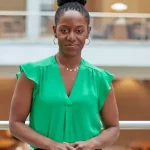Race in Education
Dr. Kenyona Walker is the Center on Education and Training for Employment’s leading scholar in the area of race and education. She provided a Professional Development learning experience for Associates at the Center on Education and Training for Employment, at the Ohio Statewide Family Engagement Center Leadership Summit, and at the Ohio Statewide Family Engagement Center’s advisory council on the topic of racism in education and the impact on Black students.
Walker’s research acknowledges that we cannot address racism until it is named, which is why building awareness is so important. There are interpersonal and systems-level action steps to address and dismantle racism to improve schools’ efforts in collaborating with the families they serve in the resources below.
How does racism in education impact Black students?
- Black students are less likely than white students to have access to college-ready courses.
- Black students have less access to honors or AP classes.
- Predominately Black schools are staffed with less qualified teachers.
- Non-Black teachers have lower expectations for Black students than Black teachers.
- Black students are two times more likely to be suspended without education services compared to their white peers.
- Schools with 90% or more of students of color spend $733 less per student.
- Black students may experience microaggressions and censoring from peers.
- Black students may experience negative narratives that they are less capable or worthy compared to White peers.
- Black students may react with exhaustion and self-censorship.
The information and resources offered below come directly from Walker’s presentations and research on this issue.
Dr. Kenyona Walker, Research Specialist at the Center on Education and Training for Employment at The Ohio State University, shares insights on educational and family engagement at the Ohio Statewide Family Engagement Advisory Council meeting in 2020. [Video is 33 minutes long and the slides are available here.]
Dr. Pedro Noguera, Distinguished Professor of Education at the Graduate School of Education and Information Studies and Faculty Director for the Center for the Transformation of Schools at UCLA, shares his insights on educational equity, Project-Based Learning, and using curiosity to drive achievement at the Project-Based Learning World Conference in 2019. [Video is 40 minutes long.]
Dr. Beverly Daniel Tatum, president emerita of Spelman College, shares her experience with her 3-year-old son telling her that a classmate told him that his skin was brown because he drank chocolate milk. Her presentation takes you through conversations with her preschool son, followed by talking to teachers, colleagues and parents, and the realization that it’s the things we don’t say and the matters we don’t discuss with our children that find their way into racist dialogue and thinking. [Video is 13 minutes long.]
The Highly Visible Invisibility of Race in School-based Family Engagement
Dr. Kenyona Walker, Dr. Melissa Ross, and Dr. David Julian, of the Center on Education and Training for Employment at The Ohio State University defined racism and placed it in the context of schools and provide interpersonal and systems-level action steps to address and dismantle racism to improve schools’ efforts in collaborating with the families they serve.
Nice White Parents
The New York Times and Serial audio podcast looks at the 60 year old relationship between white parents and the public school down the block. Chana Joffe-Walt, a reporter, looked at inequality in education, she saw that most reforms focused on whom schools were failing: Black and brown kids. But what about whom the schools are serving? In this five-part series, she turns her attention to what is arguably the most powerful force in our schools: white parents.
Racism, Injustice, Equity and Community Unrest
Cleveland Metropolitan School District assembled resources that parents and caregivers can use to talk to their children and help them sort through issues of race, racism, violence, trauma, inequity, social justice, coping and resilience.
Because of the Kids: Facing Racial and Cultural Differences in Schools
This book details the story of two teacher-researchers―Jennifer, who is African American, and Karen, who is White―as they set out on a three-year study to explore the impact of racial and cultural differences in Karen’s urban middle school classroom. Their study presents the difficulties and importance of collaborations between teachers from different racial and cultural backgrounds, and insights into how race and culture evolve in teacher-student interactions.

